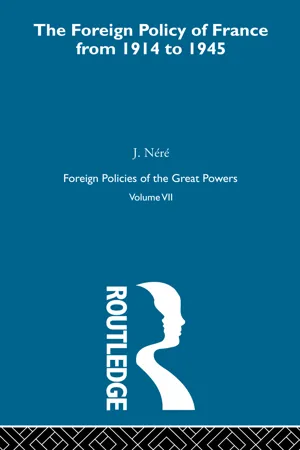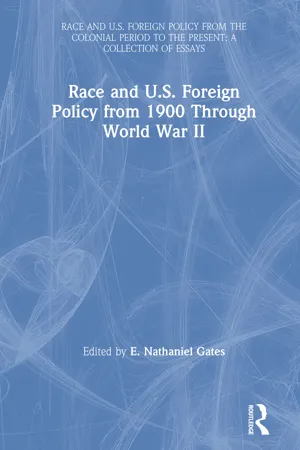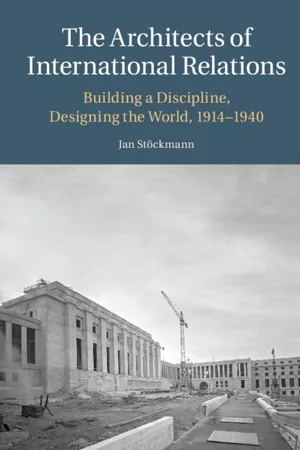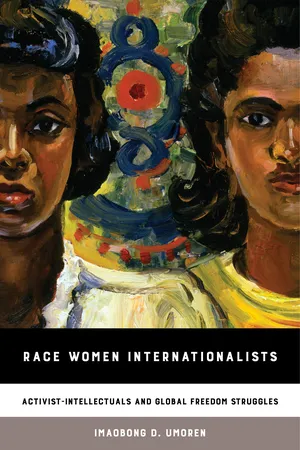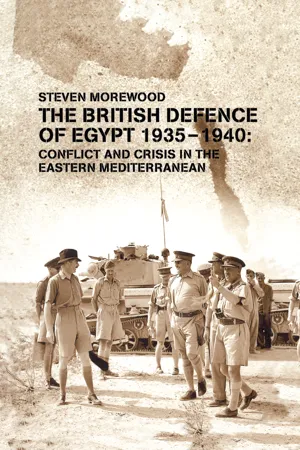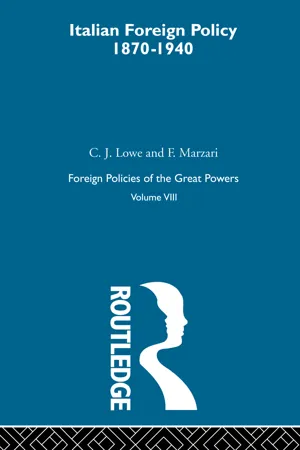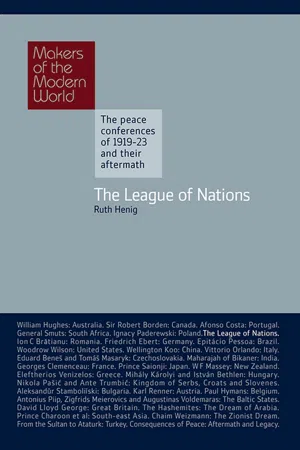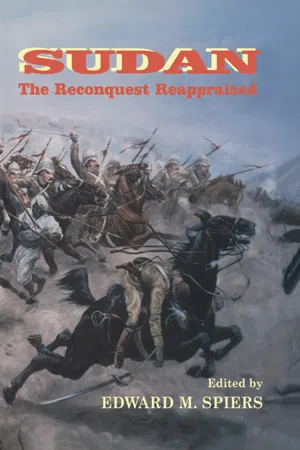History
Abyssinian Crisis
The Abyssinian Crisis, also known as the Italo-Ethiopian War, was a conflict between Italy and Ethiopia in 1935-1936. Italy's invasion of Ethiopia led to international condemnation and highlighted the weaknesses of the League of Nations in preventing aggression. The crisis ultimately contributed to the erosion of the League's authority and the onset of World War II.
Written by Perlego with AI-assistance
Related key terms
1 of 5
9 Key excerpts on "Abyssinian Crisis"
- eBook - ePub
- Nere(Author)
- 2013(Publication Date)
- Routledge(Publisher)
Chapter 12 The Abyssinia Conflict 292 and the Remilitarization of the Rhineland 292 The terms Ethiopia and Abyssinia are not perhaps strictly synonymous from the geographical point of view; however, we will use either term regardless, as was the practice at the time. DOI: 10.4324/9781315888781-12 In June 1935 France was closer than ever before to establishing the system of European security which had been her aim since 1919, and to which she had for a long time subordinated the abandoning of her privileged military situation. Several months later the entire structure was demolished and France found herself more threatened than ever, and finally set upon the downward path which would end in the disaster of 1940. We are truly at the turning-point of this history, at the point where it is of the greatest importance to understand what in fact happened. However, to explain one of the two great events under consideration, which are chronologically and also logically connected, we are still reduced to hypotheses. The Origins of the Abyssinia Conflict We have seen 293 that Italy's interest in East Africa goes back to before 1896. However, it was manifested in different ways in different periods; after the failure of the first military attempt, Italy had tried to reserve a zone of influence for herself by agreement with the two other interested countries, France and Britain. Disappointed in this, she tried at one time the method of a direct entente with Ethiopia, with whom she concluded agreements in 1928. From 1932 onwards, however, Italy reverted to a more active policy and the idea of securing French non-intervention appeared. Perhaps the threat of an economic and demographic penetration by the Japanese in Ethiopia in the autumn of 1933 was to hasten events. 294 Perhaps also the failure of the Franco-Italian agreement for a Danubian union at about the same time succeeded in deciding Mussolini to look for satisfaction elsewhere - Michael L. Krenn, Michael L. Krenn, E. Nathaniel Gates(Authors)
- 2020(Publication Date)
- Routledge(Publisher)
BLACK NATIONALISM AND THE ITALO-ETHIOPIAN CONFLICT 1934–1936William R. Scott*Determined to win Italy's long-coveted but elusive place in the sun along with the great imperial powers of Europe and to finally avenge her humiliating defeat suffered at Adwa in 1896, the fascist government of Benito Mussolini launched in October 1935 a brutal invasion of Ethiopia to establish a modern Roman empire in that independent African state. In open defiance of international law and world opinion, the Italian high command used indiscriminately all of its modern weaponry, including poison gas, upon a virtually defenseless peasant society. Despite the blatancy and brutality of Italian aggression, the Western powers, guided by self-interest, refused to impose more than the mildest of economic sanctions against Italy, leaving that country with virtually a free hand in the Abyssinian highlands.1Notwithstanding the tepid response of the great powers to the fascist invasion of the African kingdom, Italian imperialism in Ethiopia provoked an outburst of international concern, sympathy, and in some instances vehement protest from the general public. Private citizens the world over denounced Italy's violation of Ethiopian sovereignty, describing the incursion as a deliberate act of war and plunder which the civilized world abhorred. It was reported from Geneva that international peace groups, labor unions, and religious bodies had soundly condemned Italian imperialism and that the colonized peoples of color in India, Africa, the Middle East and America were demanding justice for both Ethiopia and themselves.2Although universal in scope, public condemnation of Italian aggression was particularly sharp among blacks in the United States, who had long drawn inspiration from classical and modern Ethiopia as a symbol of black power and pride. Favorable mention in classical mythologies of the Ethiopian kingdoms along the upper Nile, the tribute paid them by ancient historians as the progenitors of Egyptian civilization, and the notable success of the Abyssianians in repelling European colonialism at the close of the nineteenth century made Ethiopia a revered symbol of racial accomplishment.3- eBook - PDF
The Architects of International Relations
Building a Discipline, Designing the World, 1914-1940
- Jan Stöckmann(Author)
- 2022(Publication Date)
- Cambridge University Press(Publisher)
Manchuria and Abyssinia have become standard milestones in inter- war diplomatic history as they exemplify the struggle to curb aggres- sive foreign policy. Along with the Spanish Civil War, the 1935 Anglo- German Naval Agreement, the re-militarisation of the Rhineland, and Neville Chamberlain’s appeasement policy at Munich in 1938, they chronicle the downfall of the liberal international order. Contemporary authors were not blind to this development. They warned that Manchuria was a “crucial test of [the League’s] author- ity”, 178 and that the Italo-Abyssinian conflict would become a “clas- sic” in the history of failures of the interwar period. 179 IR scholars saw the imminent danger of these disputes as well as their broader implica- tions for the international system. Their works covered the immediate course of events, mid-term power shifts, and long-term implications for 174 Baer, Test Case, pp. 303–4. 175 E. D. Morel, ‘Foreword’, in Helena Swanwick (ed.), Builders of Peace: Being Ten Years’ History of the Union of Democratic Control (London, 1924), pp. 7–17. 176 McNair, ‘Collective Security’, p. 158. 177 Wright, ‘National Sovereignty and Collective Security’, p. 101. 178 Zimmern, Must the League Fail?, p. 9. 179 Beneš, The Struggle for Collective Security in Europe and the Italo-Abyssinian War, p. 16. Reactions to Manchuria and Abyssinia 237 the prospects of ‘collective security’. 180 In the end, sanctions failed, as most IR scholars agreed, mainly because they were not rigorously applied. Collective action either took too long to have a deterring effect – as in the Manchurian case – or lacked willingness to be implemented – as in the Italo-Abyssinian dispute. 181 A Discipline in Flux The Manchurian and Abyssinian disputes were important test cases for ‘collective security’ and, more generally, for the quality of IR scholar- ship. The architects of IR used the crises of the 1930s to advance their ideas and to comment on current affairs. - eBook - PDF
Race Women Internationalists
Activist-Intellectuals and Global Freedom Struggles
- Imaobong D. Umoren(Author)
- 2018(Publication Date)
- University of California Press(Publisher)
6 Strikes erupted in British Guiana and on the island of St. Lucia. In Trinidad, numerous “Hands Off Abyssinia” rallies occurred. 7 In 2 The Italian Invasion of Ethiopia, the Spanish Civil War, and Anti-fascist Internationalism, 1935–1939 38 Chapter 2 London, the crisis politicized the League of Coloured Peoples (LCP), and the group raised money for refugees fleeing the conflict and petitioned the crown to intervene. 8 In Harlem, riots broke out, with skirmishes between blacks and Italian Americans, worsening long-standing tensions. In New York and Washington, DC, scores of aid organizations were formed, including the Committee for Ethiopia, the Ethiopian Research Council, the Provisional Committee for the Defense of Ethiopia, the American Committee for the Defense of Ethiopia, and the Friends of Ethiopia, to name a few. 9 African Americans founded and led the majority of these groups, apart from the interracial American Committee on the Ethiopian Crisis/ American Aid for Ethiopia and the Committee for Ethiopia. 10 Even well-established organizations like the NAACP tried to lobby the US government on behalf of Ethiopia, but to no avail. Ethiopia’s special significance spurred the rapid reaction to the war among peo-ple of African descent. Despite Selassie’s reluctance to be identified as “black” or “Negro,” Ethiopia remained the “jewel in the crown of an imagined black world” due to its 7,000-year independence. 11 Its Christian history ensured its critical con-tribution to ancient civilization. In scripture, Psalm 68:31 prophesied that “princes shall come out of Egypt; Ethiopia shall soon stretch out her hands unto God,” which was understood as God’s promise to bring those of African descent out of suppression. 12 The invasion appeared to map onto a seemingly obvious black-versus-white racial divide, with black nationalists seeing it as a race war, while communists read it as the start of a fascist war. - eBook - ePub
The British Defence of Egypt, 1935-40
Conflict and Crisis in the Eastern Mediterranean
- Steve Morewood(Author)
- 2004(Publication Date)
- Routledge(Publisher)
26On the contrary, Il Duce was convinced that the Abyssinian question must be resolved before the Nazi peril became acute. Berlin was secretly pleased that the Mediterranean crisis was moving ‘the main thrust of Italian policy away from Austria to the Red Sea’.27 Mussolini assuaged the nervousness of the Italian High Command at the prospect of Hitler taking advantage by secretly securing French agreement to commit two divisions in the event of a new Austrian crisis. This military accord provided insurance lest Hitler broke his public promise, of May 1935, that Germany harboured no intention of interfering in Austrian politics or of annexing Austria. Now that Italy’s own ‘demilitarised zone’ had been secured, Mussolini grew bolder. On the anniversary of Italian entry into the Great War, he ominously told a fascist gathering: ‘Let no one hold any illusions in or out of Italy. We are tolerably circumspect before we take a decision, but once a decision is taken we march ahead and do not turn back.’ At the same time, Captain A. L. Kennedy, The Times’ diplomatic correspondent and leader writer, saw the Italian Ambassador to London. ‘Grandi laughed’, Kennedy recorded, ‘when I said Mussolini was in warlike mood; but he agreed; & added, “you know Mussolini” ’.28When the Maffey Report on British interests in Abyssinia was at last completed in June, the headwaters of the Nile at Lake Tsana were identified as the only important concern. Despite providing 80 per cent of Egypt’s irrigation water, Abyssinia had consistently frustrated Britain’s desire to construct a dam there to regulate supplies. Abyssinian opposition suddenly melted in April 1935. Soon afterwards Rome sounded out London over guaranteeing Tsana’s control in exchange for non-intervention in the Italo-Abyssinian dispute.29 Neither option was practical politics. The report took comfort from the expectation that Italy would take several years to conquer Abyssinia. Indeed, it couched its concerns over a potential future Italian threat in such moderate language that the Cabinet failed to consider the findings until late August. The Italians saw the report much sooner, purloining a copy through their agent in the British Embassy in Rome.30 - eBook - PDF
Anglo-French Relations Before the Second World War
Appeasement and Crisis
- R. Davis(Author)
- 2001(Publication Date)
- Palgrave Macmillan(Publisher)
Broken by Mussolini's intransigence and through its own inner contradictions the double- line was ultimately overtaken by a combination of events elsewhere and by the success of the Italian campaign against the ill-armed Ethiop- ians. The overall picture that emerges of British and French policies towards the Ethiopian crisis is, therefore, one of confusion and lack of direction. The characteristic inability of either to respond with adequate force and speed was fully displayed. The few attempts made, on either side of the double-line, to solve the crisis were consistently too little and too late. Decisive initiatives were absent. British and French policies, riven by conflicting advice, interests and considerations, weakened in their formulation by the absence of decisive leadership and in their application both by material weaknesses and the lack of Anglo-French solidarity, ended in failure: the League was ruined as an instrument of peace-keeping, the Italian alliance permanently damaged and Britain and France's mutual relations strained almost to breaking point. 42 Anglo-French Relations 3 Mussolini Decides on War The problem of Italian±Abyssinian relations has very recently shifted from a diplomatic level to one which can be solved only by force: like all `historical' problems of this kind it admits of only one solution, namely a resort to arms. . . . No one in Europe would raise any diffi- culty, provided the prosecution of operations resulted in an accom- plished fact. It would suffice to declare to England and France that their interests would be recognized. Mussolini's `Directive and Plan of Action to Solve the Ethiopian Question', 30 December 1934 It looks as though the French Government was at the moment unable or unwilling to take any definite line in the Italo-Ethiopian imbroglio. - eBook - ePub
Italian Foreign Policy 1870-1940
Volume III
- C.J. Lowe, F. Marzari, Lowe & Marzari(Authors)
- 2013(Publication Date)
- Routledge(Publisher)
12As it happened, little effect was given to these arrangements. The Italians attributed this to the Abyssinians’ procrastination and intransigence; the Abyssinians’ answer was that the experts appointed to decide the technical problems connected with the construction of the road were at complete variance. Difficulties centred over the location of the road between Assab and Dessie, a southern route being preferred by Italy, a northern one being suggested by Taffari’s French advisers who hoped thus to divert the road from the traffic routes served by the Jibuti–Addis Ababa railway and keep it away from the Abyssinian capital. The result was that work was constantly postponed to the double disappointment of the Italian government, on the one hand because the road was not getting built and on the other because it saw in the delays confirmation of Abyssinian and French ill will, an ill will readily emphasised by General Emilio de Bono, the future conqueror of Abyssinia and presently Under-Secretary of the Italian Colonial Office, himself as obstructionist as Taffari’s French advisers.13 The upshot was Mussolini’s refusal of Taffari’s request for two light tanks and two aeroplanes – the former to be landed at Assab and driven to the capital (over the route proposed by Italy) for the purpose of impressing on the rebel frontier chieftains the new might of the central government – in effect showing that Mussolini preferred not to strengthen the emperor’s authority, even if the pay-off for Italy was the implementation of the road convention. A joint memorandum drafted by Grandi and de Bono in January 1930 argued that to accede to the emperor’s request might give the unwanted impression that Italy was ‘an active supporter and defender’ of the negus and to risk14 - eBook - ePub
- Ruth Henig(Author)
- 2010(Publication Date)
- Haus Publishing(Publisher)
What Laval was not able to secure, however, was any firm promise of tangible British support against Nazi aggression, beyond the commitments of the League Covenant and of Locarno. Where France wished to organise military pacts aimed at encircling Germany, Britain was still hoping that conciliatory gestures might appease Hitler and draw him back into League membership and into rational discussions about armaments levels. Germany was not Britain’s only concern; Japanese nationalist ambitions were clearly a major threat in the Far East, and Mussolini’s ambitions might endanger Britain’s naval communications and bases in the Mediterranean area, which was such a vital artery for the protection of the British Empire. Thus in June 1935, the British government acted to counter one of the threats it was facing by concluding a naval pact with Germany, under the terms of which German naval expansion was agreed up to a limit of 35 per cent of the strength of the British navy. For Britain, eliminating a naval race with Germany for the next few years would give her the time to deal with the threat from Japan and seemed to make good, pragmatic sense, but to France the agreement signalled British betrayal and an obvious breach in the anti-German ‘front’ which Laval was working so hard to try to construct. Once again the two leading Geneva powers were seriously divided, just as Mussolini began to put into effect his plans for Italian expansion in north-east Africa.Italy had pursued colonial ambitions in this region since the late 19th century, but had the unenviable distinction of being the only European power to have suffered serious military defeat there, at the hands of Abyssinian warriors armed with modern French rifles at the Battle of Adowa in 1896. Since that time, the Italian government had sought agreements with Britain and France to adjust their respective colonial claims in North Africa and to establish an Italian sphere of economic interest covering the western part of Abyssinia. Abyssinia’s application for League membership in 1923 had been contentious because of the prevalence of domestic slavery there and evidence of the active involvement of many of its inhabitants in the North African slave trade and in raiding neighbouring areas for booty and for slaves. Some members, including Britain and Australia, had wanted Abyssinia’s admission to be delayed until these practices had been curbed but both France and Italy gave Abyssinia strong support, and she was admitted unanimously after her government pledged that it would do everything it could to abolish slavery and the slave trade. - eBook - ePub
Sudan
The Reconquest Reappraised
- Edward M. Spiers(Author)
- 2013(Publication Date)
- Routledge(Publisher)
6Italy, Abyssinia and the Sudan, 1885-98 JOHN GOOCHItaly's presence in the Red Sea, signalled with her acquisition of the port of Assab as a trading post in 1882 and confirmed with the appearance of a military force at Massowah on 5 February 1885, had much to do with the collapse of Egypt's hold over the Sudan in the face of the Mahdia which broke out in 1881. Italian ambitions were fuelled no less by the prospect of carving out a sphere of influence in East Africa, with British consent and at the cost of a weakened Egypt, than they were by the hope that assisting London in a time of difficulty would lead to a partnership which would safeguard Italy's interests in the Mediterranean, From these beginnings, an Italian colonial policy of expansion on to the altopiano of Eritrea developed which brought Italy into collision with the most powerful native forces in Africa. Abyssinia had already shown its military teeth: in the face of an expansionist policy begun by Khedive Ismail in 1871, Emperor Johannes IV had smashed two military expeditions against him at the battle of Gundet in 1875 and then at the battle of Gura in 1876.1 However, the tempting opportunity which the Italians mistakenly thought they perceived in the currents of Abyssinian tribal politics was reinforced by the fact that the Abyssinian Empire was intermittently under dervish attack. Likewise, military successes against the dervishes encouraged the Italians to believe that they could master the Abyssinian forces. The outcome of Italy's military adventuring, her disastrous defeat at Adowa on 1 March 1896, was to see the entire relationship with London turned on its head and, in the process, launch Kitchener's reconquest of the Sudan.Italy had missed out on an important opportunity to involve itself in Egyptian affairs alongside Great Britain in 1882: formally invited to join with Britain and France in the protection of the Suez Canal on 27 July, foreign minister Mancini had declined. His caution, formally expressed in the view that it was a matter of principle that Mediterranean affairs should be settled by a concert of all interested Mediterranean powers, was the product both of an awareness that Italy's new partners in the Triple Alliance, Germany and Austria-Hungary, were opposed to the idea and of the suspicion that France was ready to exploit any Italian involvement in Egypt by occupying Morocco, and perhaps even Tripoli.2
Index pages curate the most relevant extracts from our library of academic textbooks. They’ve been created using an in-house natural language model (NLM), each adding context and meaning to key research topics.
